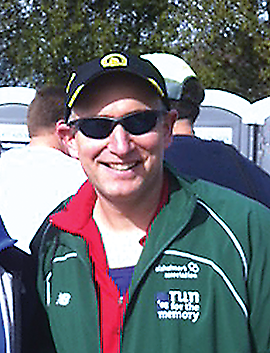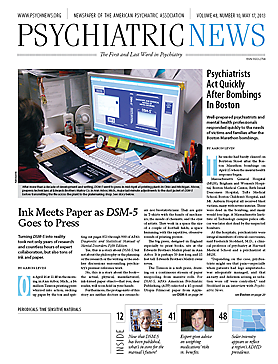Less than a minute after psychiatrist Brent Forester, M.D., crossed the finish line at Boston’s 117th Marathon—achieving his goal of running the race in under four hours—he heard the sound of what he knew had to be bad news.
“It sounded just like a loud cannon, but I was close enough to see there was smoke and debris everywhere, and I knew this was not normal,” Forester said of the attack that killed three people and injured more than 250. “I thought possibly it was an accident, a gas main, or a furnace, but it was clearly an explosion. And I knew there would be many people dead or injured.”
Forester, a geriatric psychiatrist at McLean Hospital in nearby Belmont and chair of the APA Council on Geriatric Psychiatry, was running his fourth Boston Marathon and raising money for the Alzheimer’s Association of Massachusetts and New Hampshire.
This year he also raised money—some $3,500—for the Scholar’s Program sponsored by the American Association for Geriatric Psychiatry (AAGP) and the Geriatric Mental Health Foundation, which pairs medical students and psychiatry residents with mentors in the field and brings them to the AAGP annual meeting. Running for charity causes is a common feature of the race that has become emblematic of Boston, especially so among those who are not elite athletes, but who run for a meaningful cause and the thrill of crossing the finish line to the cheers of thousands.
“The marathon, which is run on Patriots Day, is such a huge event for this city,” Forester said in an interview with Psychiatric News. “The Red Sox begin play at 11 a.m., with fans streaming out of Fenway into Kenmore Square to watch the vast majority of runners making their way to the finish line a mile away on Boylston Street. This event is not only about the runners and their individual stories, but also the hundreds of thousands of spectators lining the marathon course that make the Boston Marathon a true community spectacle from Hopkinton to Boston’s Back Bay. I cannot imagine running 26 miles in the middle of nowhere without the support and motivation that comes from the cheering crowds. It’s also amazing to consider that a regular runner can compete on the same course at the same time as the elite athletes from around the world, with support from the entire community. There’s an overwhelming flood of emotions when you finish.”
Forester noted an especially chilling aspect of the attack that Monday: the bombs were timed to go off as those countless “regular-folk” runners were crossing the finish line, and when their family and friends were bound to be there to watch.
After crossing the finish line, and after it became clear to all that something catastrophic had happened, Forester recalled a brief “stampede” of runners away from the scene. He spent the next two hours waiting to reconnect with his wife and daughter, who were driving a block from Copley Square at the time of the explosion, and two friends who had finished the marathon about 15 minutes before Forester.
At the Boston Commons, he by chance spotted three residents from the Massachusetts General Hospital/McLean psychiatry residency program with cell phones who helped him connect with his wife; they later made it safely out of the city and home. “Those residents were an incredibly welcome source of support and kindness amid the chaos and uncertainty of the moment,” Forester recalled.
The next day in Boston was a scene of “eerie quiet,” he said, with a large section of the city being treated as a crime scene. “Local residents who live near the crime scene were not yet allowed back to their homes,” he told Psychiatric News.
“I’ve never experienced something like this, and I’m not an expert in disaster psychiatry, but people here need to talk about what they have been through,” Forester emphasized. “I spoke with some of my medical students after the race, and they all wanted to do something to help. Boston’s citizens were being turned away from hospitals because they didn’t need blood at that time, though they will likely in the coming weeks. But I told the students that the injured, their families, and first responders all need a lot of emotional support.” ■

